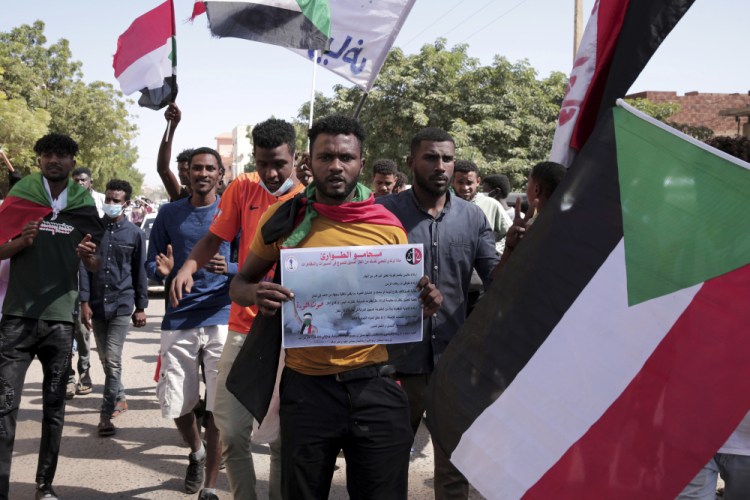CAIRO — Sudanese security forces fired tear gas to disperse protesters in Khartoum on Saturday as demonstrators once again took to the streets in the country’s capital and elsewhere to denounce the October military coup.
Thousands rallied since earlier in the day, even as authorities tightened security across Khartoum, deploying troops and closing all bridges over the Nile River linking the capital with its twin city of Omdurman and the district of Bahri, the state-run SUNA news agency reported.
Authorities had warned protesters against approaching “sovereign and strategic” sites in central Khartoum – a reference to main government buildings and key institutions. The city’s Security Committee said Sudanese forces would “deal with chaos and violations,” SUNA had reported.
The marches started in different locations, with protesters meant to converge on the presidential palace. But security forces fired live ammunition and used tear gas and water cannons disperse those attempting to approach the palace, said activist Nazim Sirag. Other marches elsewhere in the capital were violently dispersed, he added.
At least five protesters were wounded by gunfire in Omdurman and Khartoum’s East Nile neighborhood, he said. Many others suffered from breathing difficulties due to heave tear gas, he added.
Rallies were also underway in other cities, including Wad Madani and Atbara.
Last weekend, security forces violently dispersed demonstrators when they attempted to stage a sit-in near the presidential palace. At least three protesters were killed, and more than 300 were wounded on Sunday. There were also allegations of sexual violence, including rape and gang rape by security forces against female protesters, according to the United Nations.
Volker Perthes, the U.N. special envoy for Sudan, urged security forces to “protect” the planned protests, and refrain from arresting people for simply wanting to take part in the demonstrations.
“Freedom of expression is a human right. This includes full access to the internet. No one should be arrested for his or her intention to protest peacefully,” he said in a Twitter post.
Ahead of the demonstrations Saturday, activists reported disruption of internet access on phones in Khartoum, a tactic that had been used by the generals when they seized power on Oct. 25.
Advocacy group NetBlocks said Sudan was experiencing mobile internet disruptions early Saturday. “The mechanism appears similar or identical to that used during the October post-coup blackout,” Alp Toker, the group’s director, told The Associated Press.
The government did not comment on the disruptions.
The October military takeover upended a fragile planned transition to democratic rule and led to relentless street demonstrations across Sudan. At least 47 people were killed and hundreds wounded in protests triggered by the coup, according to a tally by a Sudanese medical group.
Prime Minister Abdalla Hamdok, a former U.N. official seen as the civilian face of Sudan’s transitional government, was reinstated last month amid international pressure in a deal that calls for an independent technocratic Cabinet under military oversight led by him.
That deal, however, was rejected by the pro-democracy movement, which insists that power be handed over to a fully civilian government tasked with leading the transition.
The prime minister is continuing discussions on finding a way out of the political deadlock. He met Friday with leaders of the country’s largest Umma Party, his office said.
Send questions/comments to the editors.



Success. Please wait for the page to reload. If the page does not reload within 5 seconds, please refresh the page.
Enter your email and password to access comments.
Hi, to comment on stories you must . This profile is in addition to your subscription and website login.
Already have a commenting profile? .
Invalid username/password.
Please check your email to confirm and complete your registration.
Only subscribers are eligible to post comments. Please subscribe or login first for digital access. Here’s why.
Use the form below to reset your password. When you've submitted your account email, we will send an email with a reset code.